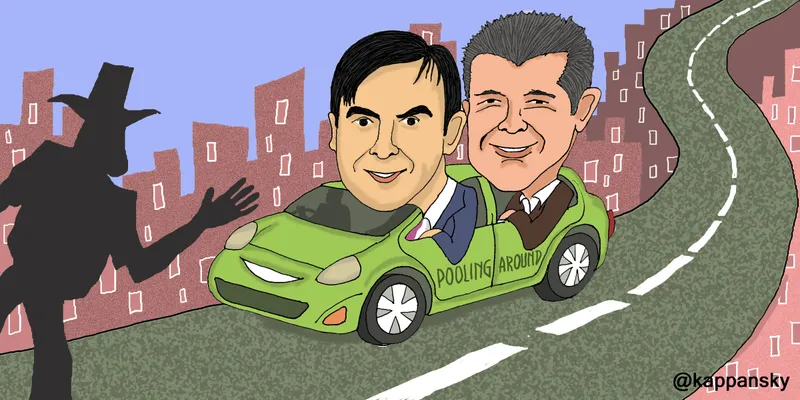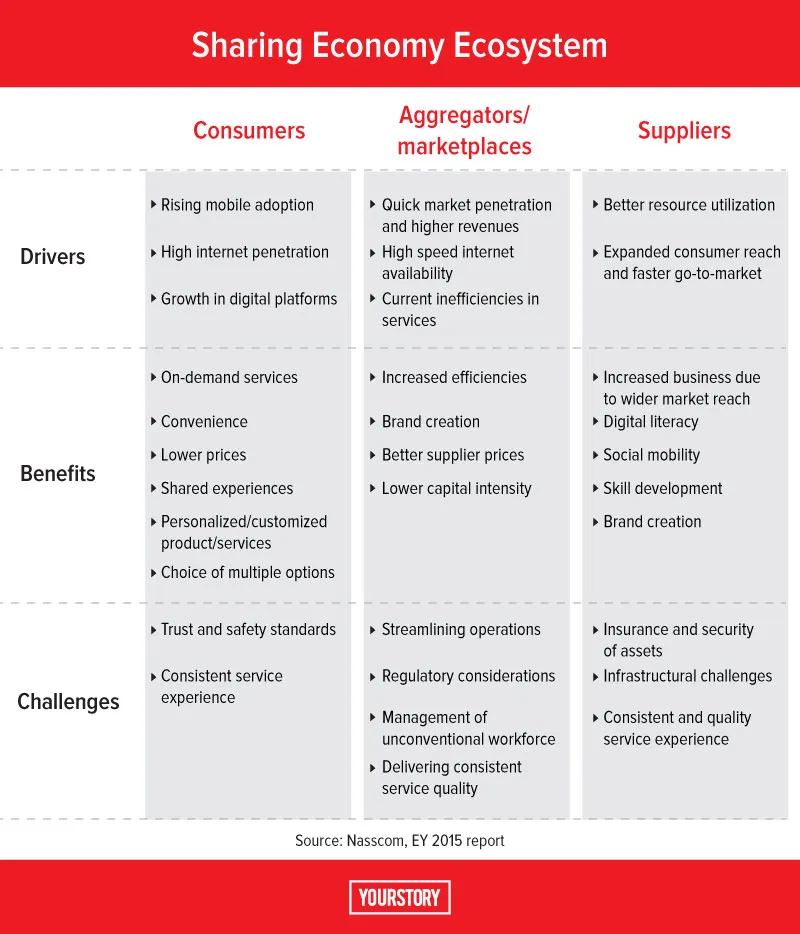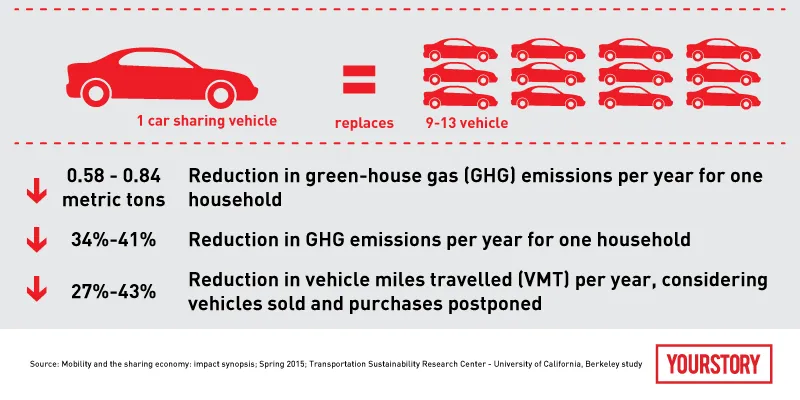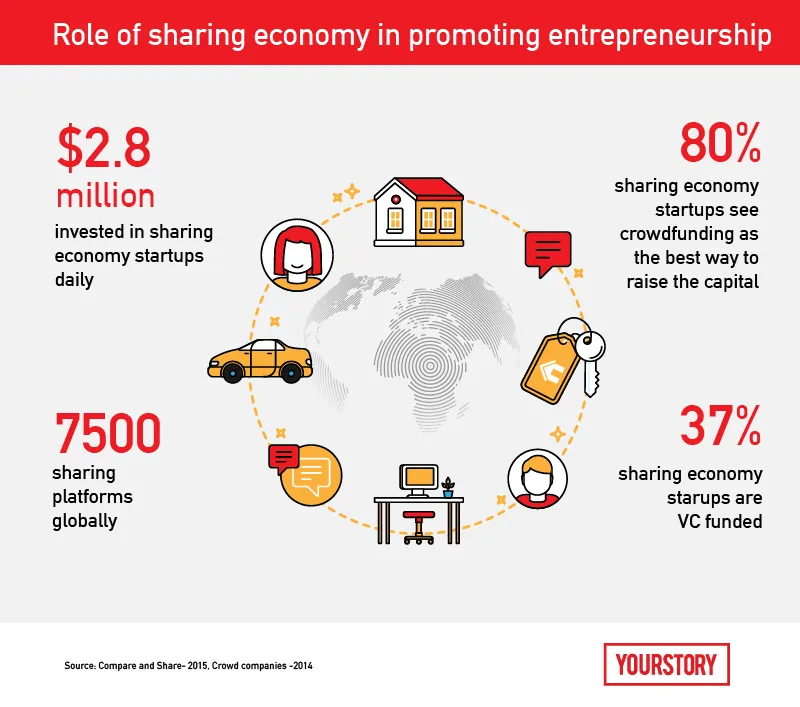Ola and Uber’s carpooling woes: should a 1989 rule define the sharing economy of 2017?
With the sharing economy sector predicted to grow to $335 billion by 2025 globally, it is interesting to see how old regulations and compliances in India are responding to new Internet businesses. Will the sharing economy truly be a leveler?

This is one level-playing field argument that taxi-aggregator rivals Ola and Uber will find themselves on the same side of.
The Karnataka government has banned its respective Olashare and UberPOOL option, saying ride-sharing is not part of the contract carriage permit under the 1989 Karnataka Motor Vehicle Rules that the two hold at present. Simply put, they cannot make money off carpooling because it amounts to replicating the public transport system.
Despite the recent order from the State government deeming it illegal, the two rivals intend to continue with their respective carpooling initiatives. The Karnataka government had given time till February 3 for the two cab aggregators to stop their carpooling services. However, according to many users of the apps, these remain to be operational well past the deadline.
A YourStory reporter, who is a regular app user, availed the Olashare option on Sunday and the driver told her that the company has got 15 more days before the State government takes its final call. To corroborate this, YourStory reached out to MK Aiyappa, Commissioner for Transport and Road Safety, who said the department had received petitions from Uber and Ola and is indeed extending the deadline by another 15 days.
Reportedly, Uber had launched an online petition in a bid to get 50,000 signatures from the citizens of Bengaluru to support UberPOOL. Responding to an email query from YourStory earlier, an Uber spokesperson had said, "We believe UberPOOL is clearly within the law. We will continue to engage with the transport department and Karnataka government as ride-sharing products like UberPOOL are the future of urban mobility, helping decongest cities by getting more people into fewer cars and letting riders move around their city more affordably.”
This is not the first time that the cab aggregators have been caught in a jam. Since their launch, there have been regular run-ins with the state government. Nor are they the only ones to have been accused of ‘traffic violations’. The shuttle bus aggregator, ZipGo, faced a similar situation and had to shut service in 2015.
Interestingly, the share services of both Ola and Uber continue without break in the other States. However, the Maharashtra government has not taken too kindly to the surge pricing issue and the matter is under consideration.
Win-win for all
But the story here is not about Ola and Uber. Rather, it is about how governments, regulators, and industry incumbents have been caught off guard. It is about how these stakeholders can change the world for the better by bringing in regulations that are win-win for all. It is about how Internet companies -- with their new business models -- are altering consumer behaviour faster than any industrial revolution could have.

Though the modern concept of a sharing economy, which rides primarily on technology, in India is relatively new and concentrated largely in urban areas, India as a society is no stranger to sharing.
Communities and joint families have for long been the crucibles that have tested relationships built around the theme of sharing.
Technology is once again presenting a similar opportunity, and it seems the millennials are the first in line to avail its benefits. A 26-year-old colleague once told me that he will never buy a car or own a house -- two premium assets the Indian middle-class judges an individual’s success by.
It is not difficult to see why sharing platforms, whether they are cab aggregators or those in the hospitality sector like Airbnb and Oyo, or fashion like Revamp my Closet and Elanic, or car rental platforms like Zoomar and Carzonrent, or even education like Byju and Vedantu, are popular with the young. It helps them experience everything without the burden of ownership.
While the Tata Nano was a symbol to fulfill the ownership aspirations of their parents, the millennials are happy to tread lightly with just a smartphone in their pocket -- a single possession that makes up for everything.
“Considering the fact that more than 65 percent of India’s population is under the age of 35, it is safe to say that India is a welcoming place for the sharing economy boom,” says Ahmad Zain, Marketing Manager of GrabonRent, an on-demand product rental service.
Boom and boon
It is easy to see the growing adoption, at least in cities like Bengaluru. Let’s take the example of Uber. It has a million registered users in the city, and 25 percent use UberPOOL. Its shared rides are 50 percent cheaper than traveling solo, and more than 25 percent of its total trips in the city are POOL trips. According to the company, “Over the last year, UberPOOL riders in Bengaluru have contributed to save around 93,64,772 kilometres driven, which equals to saving of 4,40,623 litres of fuel and cut over 10,37,000kg of CO2 emissions.”

As opposed to that over 1,600 cars are added daily on the streets of Bengaluru, and according to a State transport department official, the number of vehicles on city roads crossed the 60-lakh mark last year. The State pollution control board, following a court order, had directed the transport department to contain new vehicle registrations in the city till they were able to meet the required standard of air quality and noise pollution.
Yet, as HG Kumar, Additional Commissioner, Transport Department, said earlier, “Share and POOL services reduce the traffic congestion, which has gone from bad to worse in Bengaluru, but we still cannot allow services that replicate the public transport system. They are illegal.”
Challenging the status quo
In reference to the global sharing economy, a Mckinsey article states, “Regulators and governments have started to question the long-term impact of the sharing-economy business model... Sharing-economy players have generally fought back using either of two approaches. The first is to operate until they get noticed and then respond to challenges in the courts. The other, seen by critics as a touch patronizing, is to educate stakeholders about the benefits of the sharing economy until they finally recognise them. Both approaches, fine when companies were small and business models niche, now show signs of fatigue.”
This could very well be true in the case of India as we witness Ola and Uber collide head-on with the local government.
Despite the positive impact of sharing economy by way of resource utilisation, convenience, affordability, transparency and accountability, job creation, impact on infrastructure and environment among others, there are new challenges that sharing platforms are facing by way of old regulations.

“The traditional industries operate under the influence of regulations placed by the GoI. However, with the emergence of the sharing economy business models, there may be a need to re-examine the regulations around them and specifically address the requirements of each sub-segment of the shared ecosystem. For example, while regulations are in place for traditional taxi operators, most Indian states do not have specific regulations covering on-demand transportation platforms,” says a Nasscom-EY 2015 report titled, ‘The Rise of the Sharing Economy, the Indian Landscape.’
Adding that “regulatory policies should be agile to keep pace with the rapidly changing technologies,” the report provides an interesting example. “In crowdfunding, for instance, a venture is funded by raising small amounts of money from a large number of people, typically through an Internet-based platform. The Indian corporate law regulations require a company to go through the public offer process for raising funds from more than 200 investors, even where the amounts involved are small.”
On the consumer side, the biggest challenge that sharing platforms face is establishing trust, safety and security, risk mitigation, and consistency of quality service.
“I feel much safer when I take a share-cab rather than when I have to cab it alone,” says a 29-year-old media professional who regularly uses both Ola and Uber. “There are times when all my co-passengers are men, in such instances the driver either asks me if I would like to sit in the front or if he should refuse the others,” she says. The recent murder of a young man in the city will serve well to illustrate the flip side of the sharing economy. The victim had advertised to sell his bike on a sharing platform, only to be found murdered by the person who answered his post.
In the times we live in where it takes a matter of minutes to find people through their digital footprints, it is no wonder that the biggest concern for governments is to protect consumer interest.
Love in times of carpooling
“We believe that the sharing economy will open up a number of interesting possibilities across different economic activities and change the future of work, production, and collaboration,” the Nasscom-EY 2015 report also notes. An example of interesting possibilities could perhaps be the serendipity that leads you to find your mate in your commuting companion.
Increasingly, the young are using Share and POOL as replacements for Tinder.
Though not as blatant as it is in the West, the desire that your dream man/woman may be sitting next to you is too strong to resist. It is like the plane ride you take and hope for an attractive person to occupy the seat next to you. Only here the chances are increased. You cannot take a plane ride daily, can you?
“Every time I take a POOL, I keep my fingers crossed,” confesses a 27-year-old software professional. He is quick to strike up a conversation when he finds himself sitting next to a pretty young woman having learnt by trial and error not to wait for too long lest her destination arrives sooner than his. His quest to find a mate continues, though in the process he has saved nearly Rs 5,000 in the past month, not to mention reduced his carbon footprints. Hope his good karma is rewarded soon.
India’s increasing Internet penetration and smartphone usage are often touted as enablers for new businesses, but it will take more than just technology to ride this wave. It will take some learning for Internet companies to cross the road smoothly, that too in the face of the oncoming traffic.
(With inputs from Sindhu Kashyap)
Did you use OlaShare or UberPOOL today? Share your experience with us.







